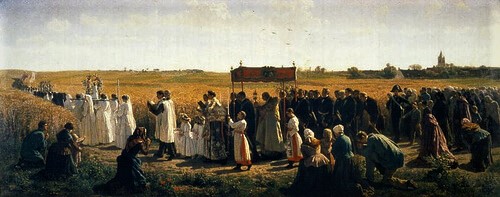Pope St. Damasus, who was born at about the same time as the two saints were martyred, says that he heard the story of these two martyrs from their executioner who had become a Christian after their deaths. Marcellinus was a priest, and Peter was an exorcist. Peter had been put into prison at Rome by the judge Serenus, simply for confessing the Christian faith.
During his imprisonment Peter set free Paulina, the daughter of Artemius, the keeper of the prison, from an evil spirit which tormented her. As a result of this, Artemius and his wife and all their house, with their neighbors who had run together to see the strange thing, were converted to Jesus Christ. Peter was set free by the jailer, and he brought all the new converts to Marcellinus the priest, who baptized them all.
When the judge Serenus heard of it, he called Peter and Marcellinus before him, and demanded that they deny Christ. They both refused to deny their faith, so they were separated, and Marcellinus the priest was treated in a particularly cruel way. He was beaten and stripped of his clothing, and was shut up in a completely dark cell which had broken glass strewn all over the floor. The slightest movement caused his flesh to be sliced open. Peter was in a nearby cell, and they comforted one another by loudly proclaiming their faith. When it was obvious they would not deny Christ, they were brought out of their cells and were beheaded. Their bodies were taken far outside the city and thrown deep in a dark forest so they would never be found. As it happened, a Christian woman did find their bodies, and she had them brought back and buried their bodies in the catacombs. Their tombs became a place of pilgrimage for the early Christians, who were inspired by their faithful witness even to death.
O God, who makest us glad with the yearly festival of thy Martyrs, Marcellinus and Peter: grant, we beseech thee; that as we do rejoice in their merits, so we may be enkindled to follow them in all virtuous and godly living; through Jesus Christ thy Son our Lord, who liveth and reigneth with thee, in the unity of the Holy Spirit, ever one God, world without end. Amen.














